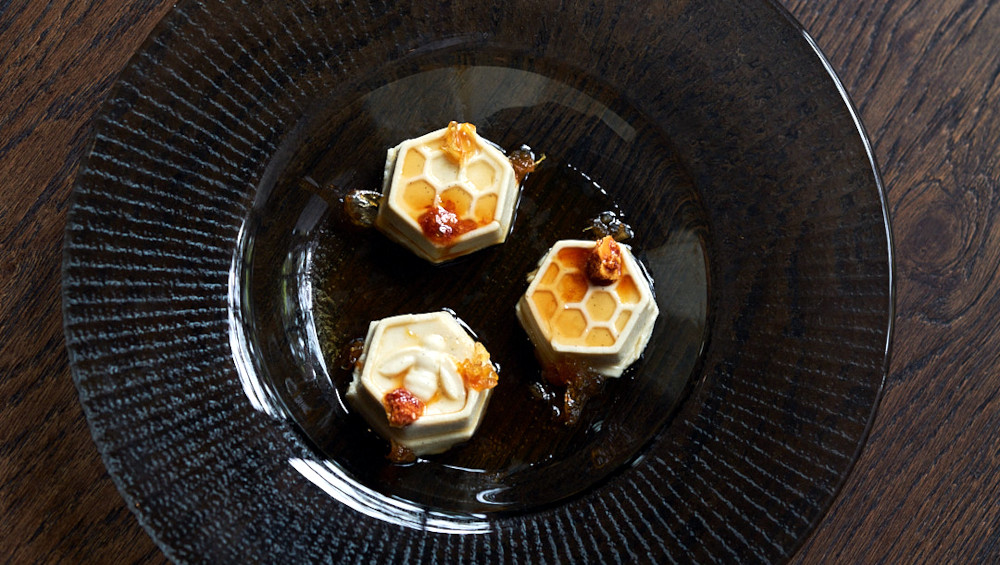Oakland-based startup MeliBio has created the world's first vegan honey — molecularly identical to the bee-made version, but a delicious and sustainable alternative that supports bee biodiversity.
Bees are essential to human survival — which is responsible for roughly 80
percent of worldwide
pollination,
which is fundamental to maintaining global biodiversity and a majority of our
food production.
While there are thousands of species of bees, honeybees are understandably the
most popular — due to the delicious byproduct of their foraging. The demand for
honey has grown over the years — the industry is valued at $8.17
billion
and expected to reach $14 billion by
2025. Unfortunately, such
a focus on the health of one species has put the others at risk; high densities
of commercial honeybee colonies have increased competition between native
pollinators
for forage, putting even more pressure on the wild species that are already in
decline — and thus, threatening the stability of our natural ecosystems. Over
20,000 wild and native bee species are endangered due to the effects of climate
change and the rise of commercially farmed bees as an invasive species — with a
staggering 90 percent
decline
in the world’s bee population in recent years. Managed bees are further adding
to this decline by spreading and intensifying
diseases in
wild bees.
Still, factors including pests, climate change and pesticides are also
contributing to colony collapse
disorder —
which has seen billions of worker bees, critical to the operation and survival
of a colony, leave behind their hives and their queen — in honeybees, as well;
studies
estimate a 30 percent decline in honeybee populations each year since 2006.
With global bee populations dwindling, honey manufacturers are now facing a
highly volatile and unpredictable supply chain. While startup innovators such as
Beewise
are working to help reverse the decline in honeybee populations with AI and
robotics, another is working to take the pressure off of honeybees in a totally
different way — Oakland, California-based startup
MeliBio has just developed the world's first
bee-less honey.
The Regen Ag Summit at SB Brand-Led Culture Change
Hear the latest case studies, partnerships, innovations and educational initiatives fostering the continued growth, scale and impacts of regenerative agriculture throughout the world - Thurs, May 9, at Brand-Led Culture Change.
Much like innovations from companies such as Perfect
Day
— which aims to give dairy cows a rest with its fermented whey protein that’s
molecularly identical to that found in milk, without a cow in sight — Melibio’s
fully plant-based, fermented breakthrough (which is identical to honey in taste
and nutritional value) could take a significant amount of pressure off
beekeepers and honeybees to keep up with the global demand of honey, whilst
safeguarding the thousands of other native bee species negatively impacted by
the industry.
“We need all of our bees to thrive, because bee biodiversity directly affects
the sustainability of our planet,” Darko
Mandich, a European honey industry
veteran and now co-founder and CEO of MeliBio, told Sustainable
Brands®. “MeliBio is making bee-free honey using a novel process,
marrying nature and science to mimic what bees are doing in nature and create
animal-free products that match bee-made ones, on a molecular level. Growing
this industry to meet current and future demands through science helps to give
bees a break whilst also supporting them to thrive and keep our planet
pollinated.”
 BAIA's panna cotta with MeliBio honey | Image credit: MeliBio
BAIA's panna cotta with MeliBio honey | Image credit: MeliBio
Mandich says sustainability was at the forefront of the development of its
bee-free honey, followed by industry concerns about quality and authenticity of
the product: Honey has been found to be the third most-faked food, behind milk
and olive oil. Fake honey has adverse effects throughout the value chain —
affecting beekeepers, honeybees and
consumers.
Another advantage: In addition to being vegan, MeliBio’s lab-made version
doesn’t contain Clostridium
bacteria — a
toxin found in honey that makes it unsafe to eat for new mothers and babies.
“Our planet is struggling; and we need to reinvent many industries and products
that we rely on. There is a great opportunity for humankind to leverage all the
knowledge we have been generating to create a world which can serve us and
future generations. Sustainability is the name of the game; and breakthroughs
drive us into a sustainable world,” Mandich asserts.
The vegan honey (which Bon Appetit
attests “tastes like the real
deal”) is already exciting the food, beverage and cosmetics industry — with more
than 50 companies from around the world on the waitlist for its official launch
next year.
“Our bee-free honey works perfectly in various culinary applications,” Mandich
says; so, MeliBio is first focusing on partnerships: It has collaborated with
Michelin-starred restaurant Eleven Madison
Park in Manhattan; and plant-based
eateries Little Choc Apothecary and Butcher’s
Daughter in Brooklyn, and
BAIA in San Francisco.
As buzz continues to build ahead of its wider launch, the CEO says MeliBio is in
discussions with many CPG companies in the US and Europe — it recently
announced a partnership with Narayan
Foods
to bring MeliBio’s plant-based honey to shelves in 75,000 European stores under
the company’s Better Foodie brand — and “we look forward to announcing more
partnerships soon.”
Published Dec 19, 2022 7am EST / 4am PST / 12pm GMT / 1pm CET
Scarlett Buckley is a London-based freelance sustainability writer with an MSc in Creative Arts & Mental Health.